It’s always considered a huge advantage if you can speak more than one language fluently. Good command over multiple languages looks great on your resume and increases your chances of finding good opportunities in different parts of the world. Moreover, it’s a nifty hobby to have.
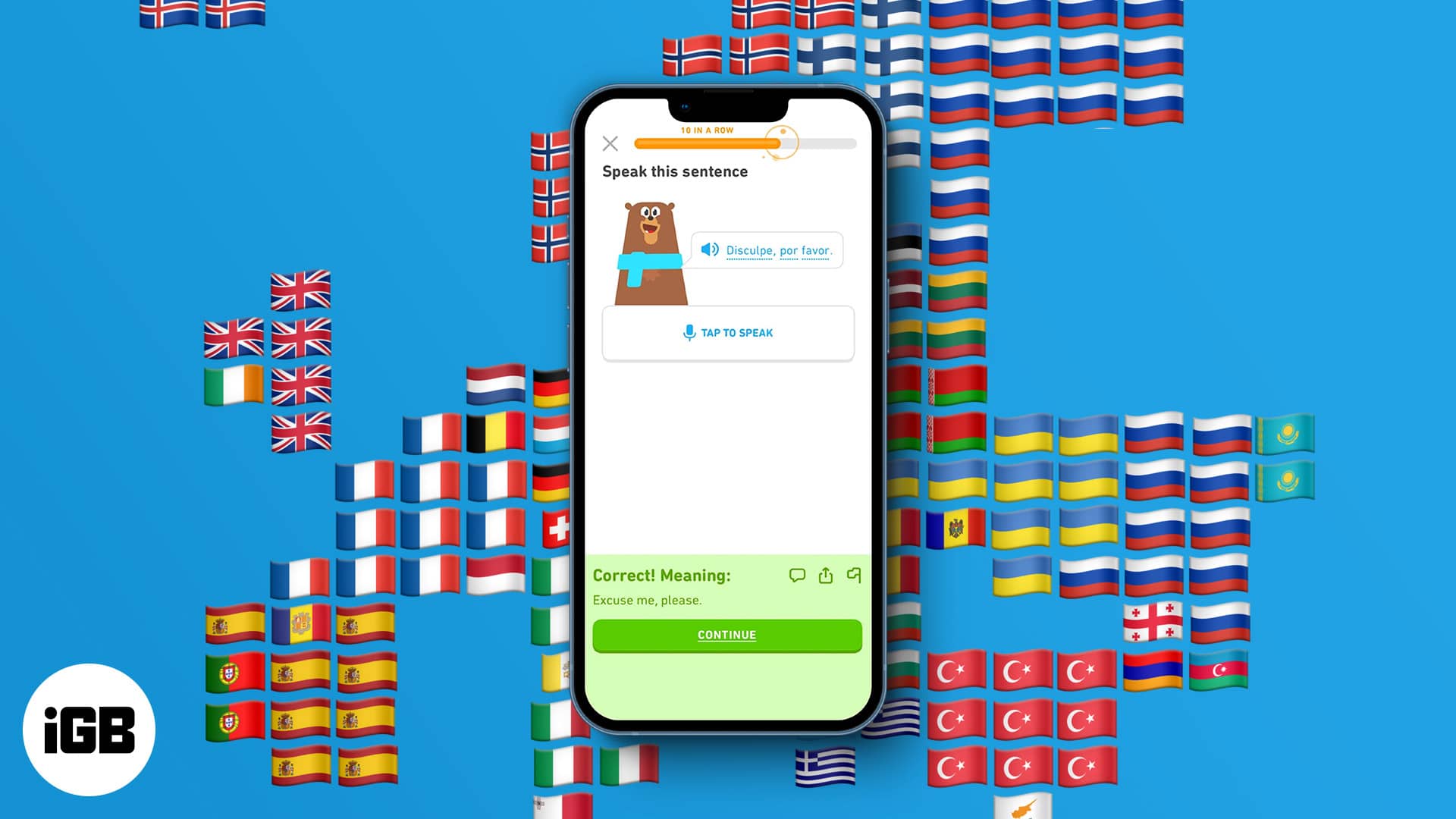
To ensure that your language barriers are ever so slightly reduced, I’ve curated the best language-learning apps for iPhone and iPad. Let’s look at the myriad of apps available online, shall we?
Table of Contents
- 1. Duolingo – Editor's choice
- 2. LingoDeer – Structured courses
- 3. Rosetta Stone – 24 languages in detail
- 4. Memrise – Video language learning
- 5. Beelinguapp – News, articles, music
- 6. LinQ – Plenty of downloadable content
- 7. Babbel – Best for Spanish, French, Italian
- 8. Busuu – Perfect for learning Japanese
- 9. Tandem: Conversation exchange
- 10. Cambly – Great for non-native English speakers
- 11. Drops – Highly polished
- 12. Mango Languages – Extensive coverage of 70 major languages
- 13. HelloTalk – A thriving community
1. Duolingo – Editor’s choice
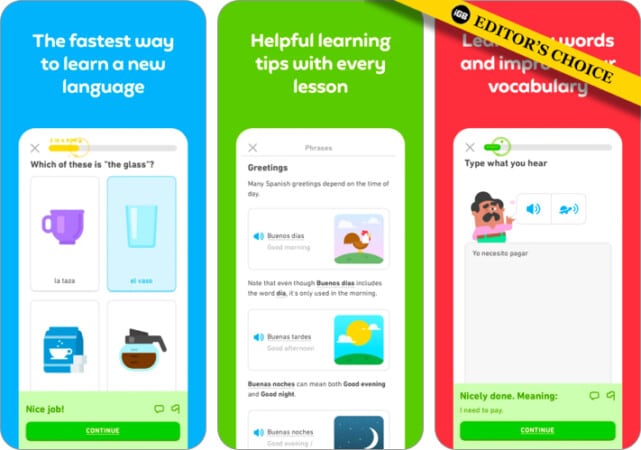
This was a rather easy choice for the top spot. Duolingo has been around for a long time and has become one of the best iPhone apps for learning a new language. It has an easy user interface that anybody can use.
Additionally, there are multiple languages that you can learn based on your current skill level. It doesn’t matter if you’re a beginner or can hold a conversation in a different language. Duolingo gives you ample opportunity to improve your command of a specific language.
It also takes visual learning into account. It would be great if you could teach kids different languages at an early age, as they’re more receptive to visuals.
The only issue with this app is that it charges a substantial amount of money for the premium version.
Pros
- Perfect, regardless of your skill level
- Great for kids, thanks to visual learning
- Teaches the basics of multiple world languages
Cons
- The premium version is expensive
Price: Free (In-app purchases start at $4.99)
2. LingoDeer – Structured courses
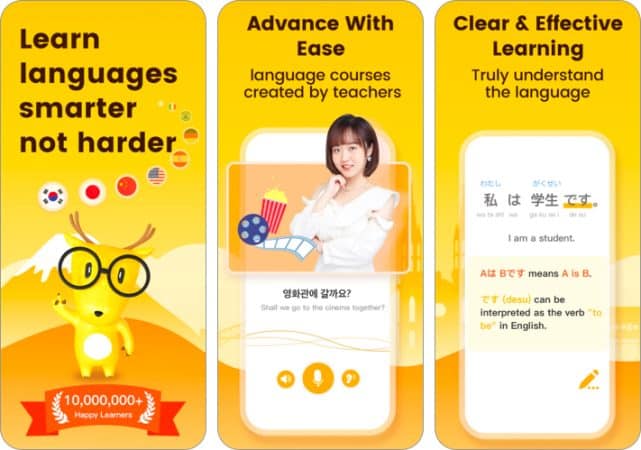
LingoDeer may not provide you with a spectrum of languages to learn. However, it provides a stable structure catered to your skill level.
After all, it takes longer to pick up a language’s nuances if you’re learning without structure. Thankfully, LingoDeer speeds up the process with mini-lessons you can complete anytime during your workday. This keeps you in touch with your lessons without having to take up too much of your time.
It also teaches you how to write in the native language script you’re learning. This is especially useful when you’re learning to speak Japanese or Korean.
Unfortunately, you’ll have to pay for the main courses. Other apps of this nature tend to make the main courses free while enabling customers to pay for add-ons.
Pros
- Structured courses
- Mini lessons to ensure you don’t miss a day of learning
- Uses the language’s native script
Cons
- You have to pay for the bulk of the course
Price: Free (In-app purchases start at $12.99)
3. Rosetta Stone – 24 languages in detail
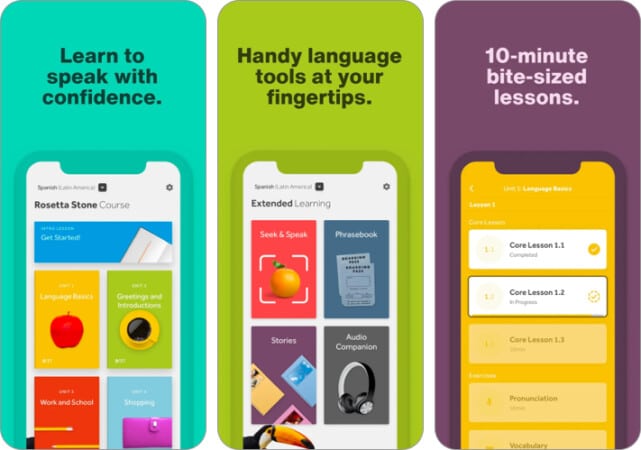
Very few language learning apps for iPhones provide courses for multiple languages, and that too in detail. Rosetta Stone is one of those few great apps.
You can personalize a learning plan based on your daily routine. The app’s AI will change the lesson plans according to your progress. If you’re traveling for a while and don’t want to miss your lessons, you can download and complete them offline, too.
Since pronunciation is a huge part of learning a language, the app also gives instant feedback on whether your pronunciation is correct, wrong, or needs a slight improvement. This app is meticulous!
My main issue with the app is the price of the in-app purchases. They’re exorbitant!
Pros
- Detailed learning plans for multiple languages
- Lessons can be downloaded
- Instant feedback on pronunciations
Cons
- Expensive in-app purchases
Price: Free (In-app purchases start at $44.99)
4. Memrise – Video language learning
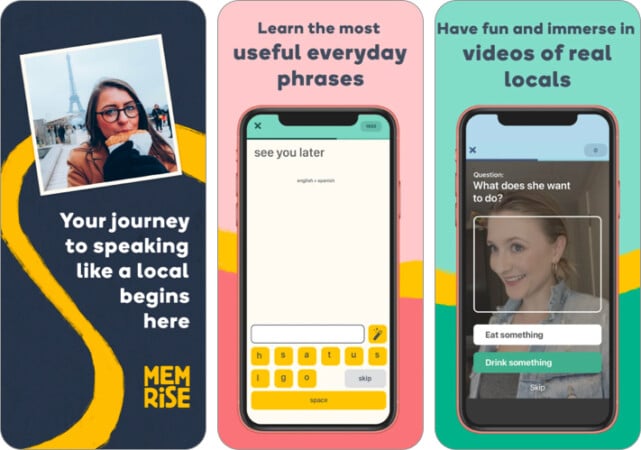
Memrise is one of the best language-learning apps for iPhones due to one particular aspect. This aspect is learning through videos of native speakers.
While you can try to learn a language all you want through AI and automated voices, watching someone speak a language and listening to them quickens the learning process. You can understand the nuances and cadences much better. This is what Memrise provides to its users.
It also has a bunch of less common dialects that you can learn. This is helpful as common dialects are not usually found in language learning apps.
The in-app purchases are quite expensive, reducing the app’s accessibility.
Pros
- Offers videos of native speakers
- Plenty of common dialects
Cons
- Costly in-app purchases
Price: Free (In-app purchases start at $2.99)
5. Beelinguapp – News, articles, music
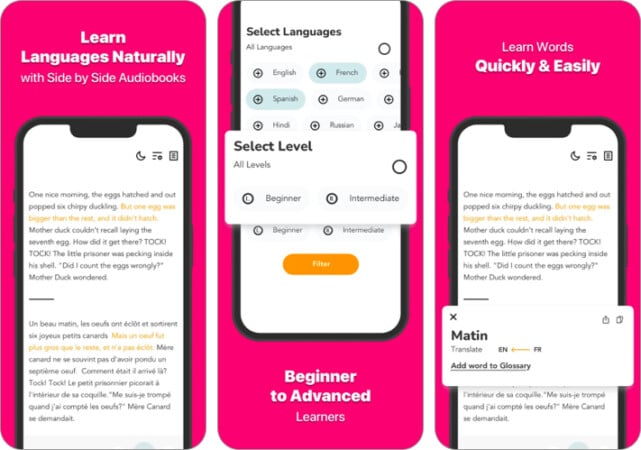
While most language learning apps focus on teaching specific words or sentences, they don’t provide you with more material in the native language. Beelinguapp changes this aspect of such apps.
With this app, you’ll be able to read, learn, speak, listen, and understand the language more engagingly. For example, if you’re learning the famous tale of The Ugly Duckling, you’ll also be instructed to read it in a language such as French (if that’s what you’re focusing on). This method is also applied to news bits and native music.
This structural process makes learning more interesting. You’ll spend hours on this app, attempting to understand song lyrics.
The app is slightly buggy, though. It tends to crash, and the search bar is unusable at times.
Pros
- Various world languages are covered
- Includes music and stories in the language you’re learning
- Far more engaging than competitors
Cons
- Slightly buggy user interface
Price: Free (In-app purchases start at $5.49)
6. LinQ – Plenty of downloadable content
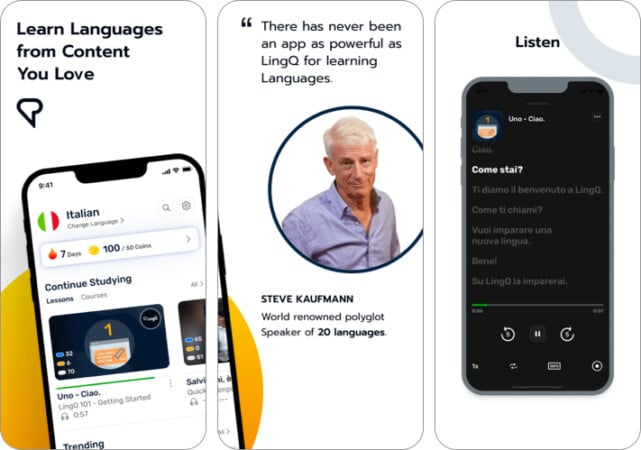
What’s better than an app that teaches you a broad range of languages in a structured manner? When that app lets you download all your favorite lessons, of course!
LinQ is one such app that provides over 1000 lessons for more than 40 languages. These lessons cater to your skill level; you can download them so you don’t miss any lessons on the go!
It also provides podcasts and interviews in the language you’re learning. This challenges your comprehension skills and allows you to decipher difficult languages through conversations with native speakers. Lastly, no matter which device you use, you can sync all your lessons to ensure they’re accessible!
The in-app purchases aren’t cheap, though. You’ll be locked out of most of the content if you’re a free user.
Pros
- Huge list of lessons
- Over 40 languages to learn
- Native-speaker conversations keep the lessons interesting
- It can be synced on all devices
Cons
- In-app purchases are expensive
Price: Free (In-app purchases start at $12.99)
7. Babbel – Best for Spanish, French, Italian
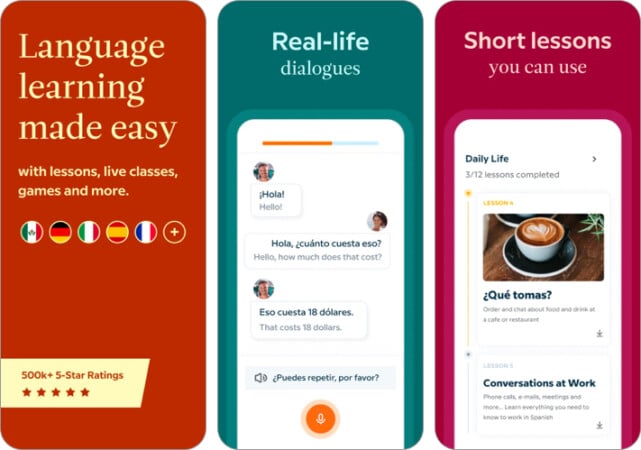
Sometimes, a few language-learning apps for iPhones provide many languages under the same umbrella. However, they often miss out on the nuances of most languages as they cannot go deep into the learning structures for those languages.
Become an iGeeksBlog Premium member and access our content ad-free with additional perks.
With Babbel, you can easily specialize in Spanish, French, and Italian. This is because the app concentrates most of its content on these three European languages. While there are other languages you can learn through the app, their lessons in the aforementioned languages are the best. It also has a review feature that lets you easily recap what you’ve learned and fix mistakes.
The learning curve of this app is quite steep, though. It doesn’t allow you to make too many mistakes. This can be disconcerting for many users.
Pros
- Great for learning Spanish, Italian, French
- The review feature helps you correct your mistakes
Cons
- Has a steep learning curve
Price: Free (In-app purchases start at $17.99)
8. Busuu – Perfect for learning Japanese
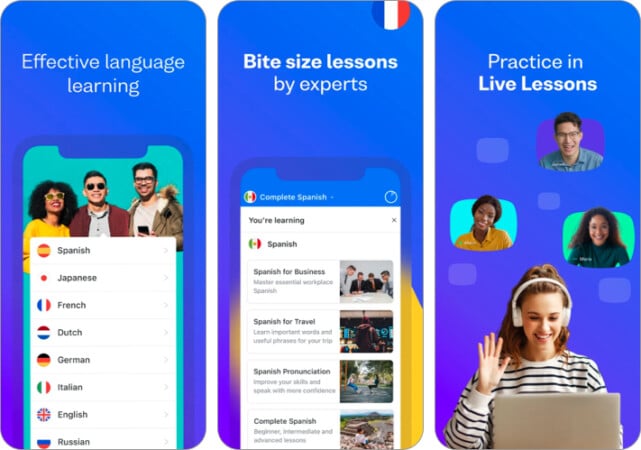
Japanese is fast becoming a global language, thanks to the advancements that Japan is making in various industries. If you want to learn Japanese for professional or personal reasons and don’t have the time to go to language classes, Busuu should be the app you use.
While it offers other languages, such as Spanish, I’d recommend using this app specifically for Japanese. Moreover, you get small tidbits of information and useful tips from language experts to improve your pronunciation and vocabulary.
Additionally, if you want to learn Japanese for either business or travel, you can do that too with specific options in the app. However, the free version of this app seems to provide only basic lessons in some languages. It hardly goes in-depth when it comes to learning the different world languages.
Pros
- The best app to learn Japanese
- Language experts give you helpful tips
- Specific use cases for learning the language
Cons
- Coverage in other languages isn’t great
Price: Free (In-app purchases start at $6.99)
9. Tandem: Conversation exchange
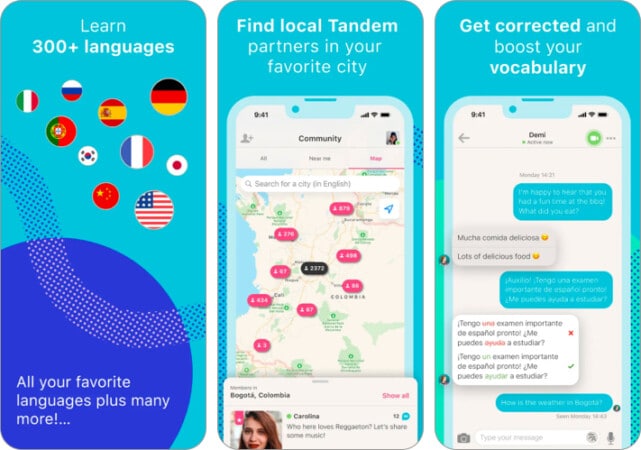
There are two primary ways to learn a language fast. Firstly, you can take up a structured course. Secondly, you can learn through trial and error by speaking the language with native speakers.
With Tandem, you get both. The app provides over 300 languages to learn. Moreover, you can get on audio and video calls with verified native speakers to understand and improve your cadence, vocabulary, and pronunciation. In general, you get a much better understanding of the language itself.
The app suffers from some random glitches, though. They’re not dealbreakers, but they can be annoying enough to impede the experience.
Pros
- Helps you talk to native language speakers
- Over 300 languages
Cons
- The app is glitchy at times
Price: Free (In-app purchases start at $18.99)
10. Cambly – Great for non-native English speakers
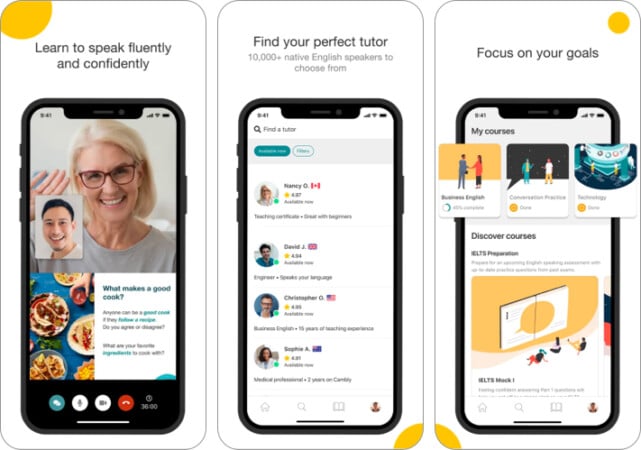
English is one of the most widely used languages today. In fact, it is one of the truly global languages that is used in multiple industries. As such, it’s important to grasp English well, regardless of your country.
With Cambly, you can improve your English by taking proper courses and understanding the nuances of the language. Moreover, you’ve got native English speakers ready to help if you face issues in your lessons. If you’re unsure about your language prowess or want to improve, Cambly is great!
If you plan to sign up as a tutor on Cambly, you’ll face some user interface issues. Most tutors have stated that a separate app for tutors would be a good idea.
Pros
- Best for non-native English speakers
- Tutors to help you learn the language better
Cons
- Needs a separate app for tutors
Price: Free
11. Drops – Highly polished
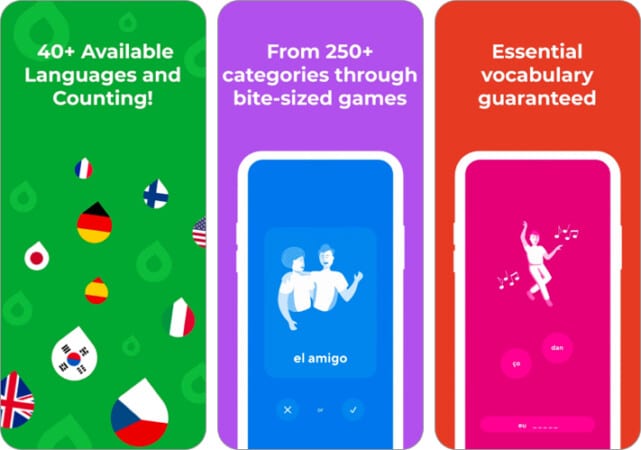
Drops is one of iPhone’s best language learning apps, especially for its aesthetics. It gives you such a polished feel that you’d want to start and check the app daily.
The lessons have a mini-structure of sorts. You can learn words and improve your vocabulary for a language, little by little. Moreover, it has small games to ensure that visual learners can keep themselves engaged with the learning process.
You just need to use this app for five minutes per day, and pretty soon, you’ll be changing app languages just to test your new language skillset! However, the app’s user experience suffers a bit due to the consistent ads.
Pros
- Refined aesthetics
- Lessons are small and easy to learn
- Works well for visual learners
Cons
- Constant ads interrupt the learning process
Price: Free (In-app purchases start at $7.99)
12. Mango Languages – Extensive coverage of 70 major languages
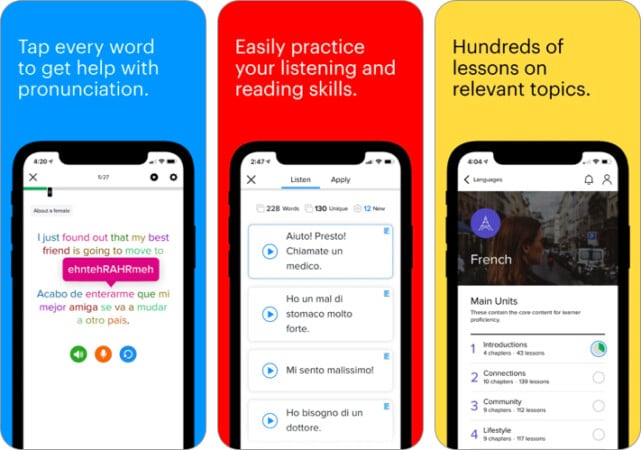
Mango Languages uses a proven method called Intuitive Language Construction. It targets the four important pillars of learning a language to a native’s fluency level.
You can choose your skill level in a language and start from there. However, if you’re a beginner, the app will first focus on building your vocabulary and pronunciation. After that, your grammar in the language will be reviewed.
If the algorithm notices that the first three steps are complete, you’ll move on to cultural contexts. Learning a language in this manner helps you understand the roots of the language better.
However, if you’re serious about learning the language and need the IPA deconstruction of words for pronunciation purposes, you won’t be getting it here. At best, you’ll be provided with the anglicized versions.
Pros
- Over 70 languages to learn
- It follows a proven pattern for language learning
- Cultural and contextual learning also provided
Cons
- IPA deconstruction of words isn’t available
Price: Free (In-app purchases start at $7.99)
13. HelloTalk – A thriving community
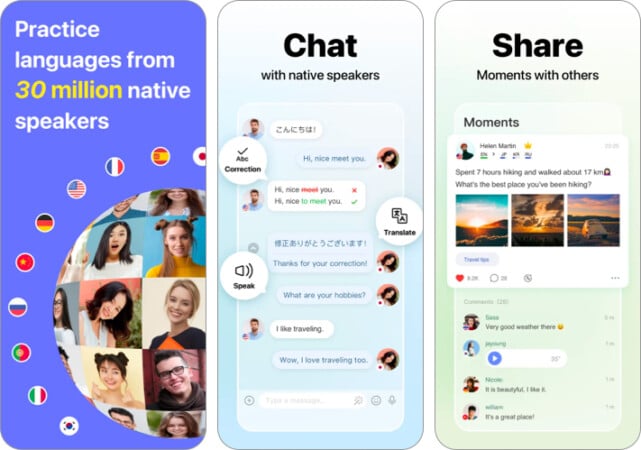
HelloTalk’s biggest flex is that it connects you with thousands of people online, based on whichever language you want to learn. You can interact with them daily and clear your doubts.
There are over 30 million people in the HelloTalk community. With the Moments feature, you can share your questions on culture, language, and travel to clear your doubts. If you’re unsure about your pronunciation, you can leave audio messages in the forum, and your queries will get answered by millions of people.
You can also have 1-on-1 language lessons with a native speaker. The native tutors are certified teachers and will teach you regardless of your progression in the language. Overall, it’s definitely one of the best iPhone apps for learning a new language.
The app has some user interface issues, especially with the Moments feature and comment section being on the clunky side. Hopefully, developers can change the interface in future updates.
Pros
- Huge community to help you learn
- Common forum to have your queries answered
- Native language tutors available
Cons
- Some parts of the app are clunky
Price: Free (In-app purchases start at $0.99)
Summing up…
While there are plenty of apps online, these are my picks of the best language-learning apps on iPhone and iPad. Whether you’re looking for structured courses or lessons from native speakers, you can get them all with these apps. If you’ve used any of these apps, share your experience in the comment section below!
Read more:
